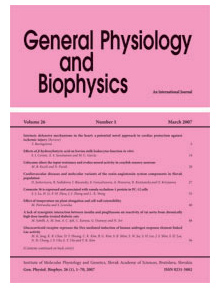General Physiology and Biophysics Vol.26, p.56-61, 2007
|
| Title: Glucocorticoid receptor represses the Dex-mediated induction of human androgen response element-linked Luc activity |
| Author: M. K. Jang, K. R. Chae, D. Y. Hwang, C. K. Kim, B. G. Kim, S. B. Shim, S. W. Jee, S. H. Lee, J. S. Shin, S. H. Lee, N. H. Chung, J. S. Cho, S. Y. Choi, Y. K. Kim |
|
Abstract: A human androgen response element (hARE), identified within intron 8 of the human sterol regulatory element-binding protein cleavage-activating protein, interacts with both glucocorticoid receptor (GR) and androgen receptors (AR). The aim of this study was to test the hypothesis that human GR (hGR) might modulate the expression of a hARE-linked reporter gene by dexamethasone (Dex). The hypothesis was tested by: a) co-transfecting HepG2 cells with a hGR and a luciferase Luc)-reporter gene for performing in vitro investigations and b) by their co-injection into the tail vein of mice for in vivo investigation. In vitro co-transfected cells and the in vivo co-injected mice were then treated with Dex. Our results have led us to concluded that both transfection and injection of the hGR leads to a repression in the Dex-mediated induction of hARE-linked Luc activity both in vitro and in vivo settings. These findings suggest that this assay system allows screening of drug candidates affecting to a signal transduction pathway of the GR and AR and may help in the future discovery and analysis of novel and selection of GR and AR agonists.
|
|
| Keywords: Androgen response element — Dexamethasone — Glucocorticoid — Glucocorticoid
receptor |
| Year: 2007, Volume: 26, Issue: |
Page From: 56, Page To: 61 |
|
|
|
|
|
 download file download file |
|
|
|
|
 download file
download file
